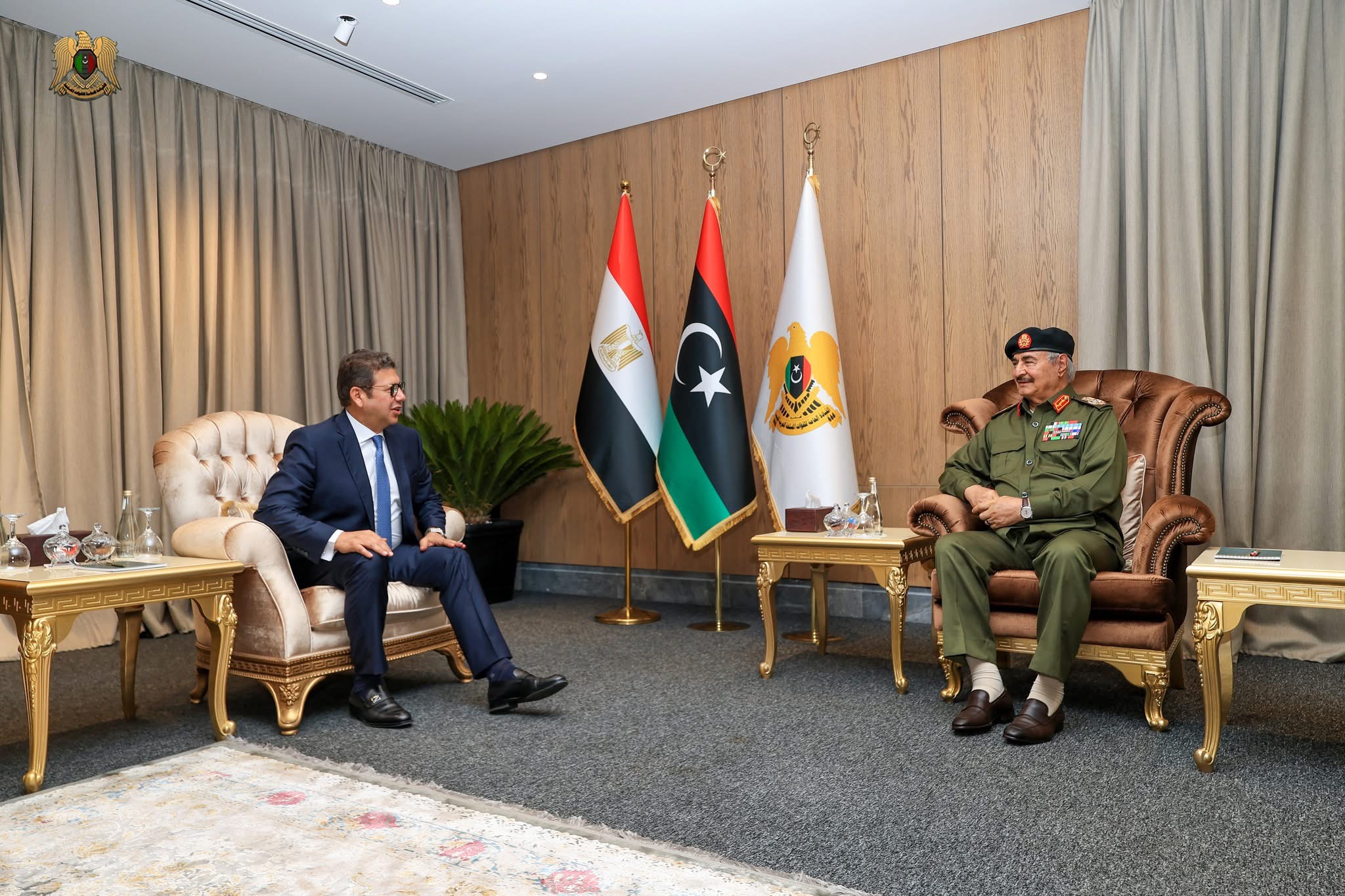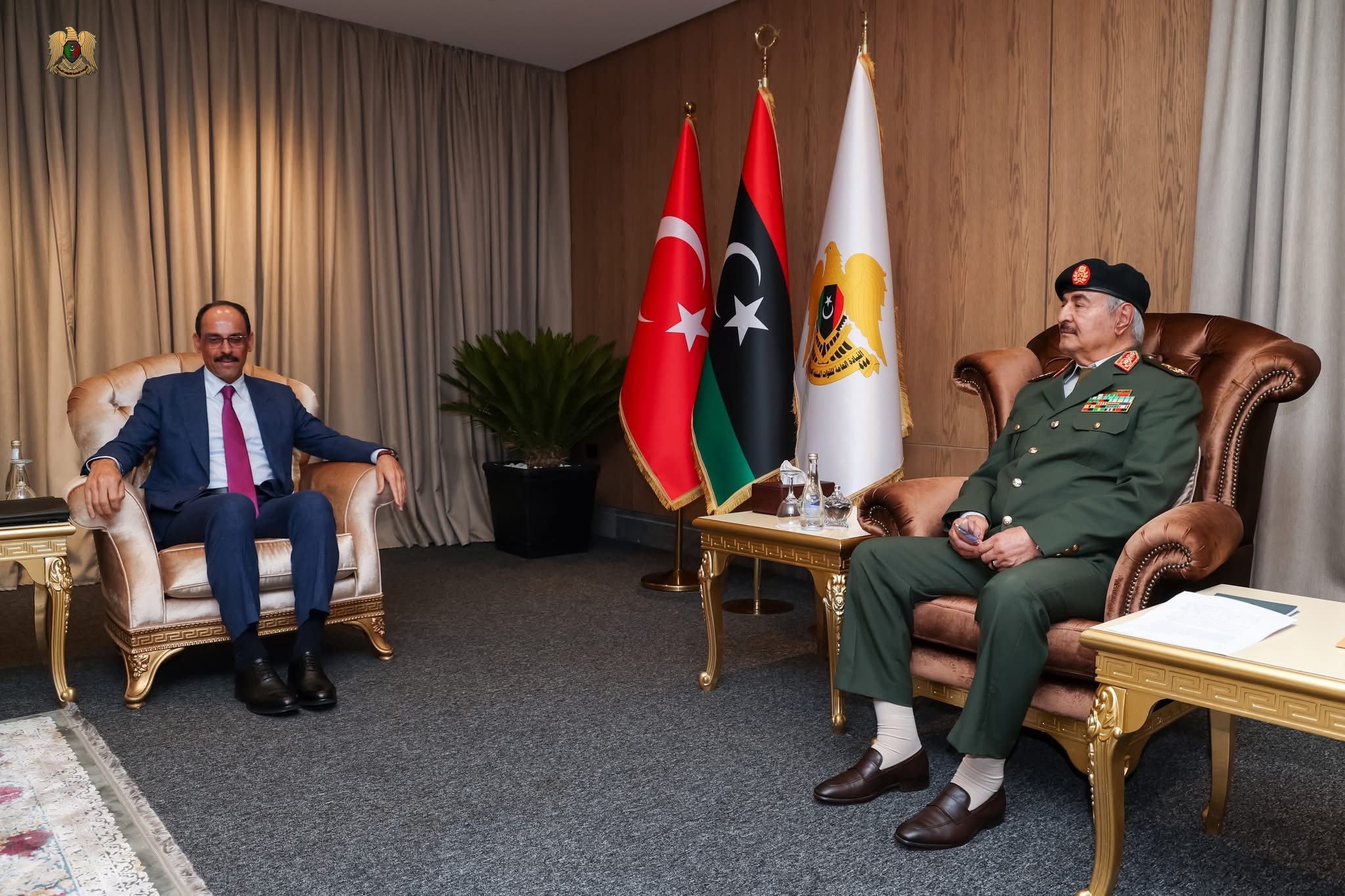Libya — Back-to-back visits by Egyptian, Turkish intelligence chiefs put al-Rajma at the center of a new regional calculus
Over the span of two days, al-Rajma—the headquarters of Libya’s armed forces—received two high-profile guests who rarely appear on the same itinerary: Egypt’s intelligence chief, Lt. Gen. Hussein Rashad, and Turkey’s intelligence chief, Ibrahim Kalin. The consecutive meetings were anything but routine. They signaled a recalibration of how Libya fits into wider regional security and politics—and where al-Rajma now sits within that map.

On Sunday, Field Marshal Khalifa Haftar hosted Rashad alongside the LNA’s deputy commander, Lt. Gen. Saddam Haftar. Twenty-four hours later, Haftar met Kalin in what observers described as a first-of-its-kind encounter that underscores a pragmatic turn by the general command since Saddam Haftar’s rise in recent years—one that puts “interests first.”

Al-Rajma also received Paul Soler, President Emmanuel Macron’s special envoy, on Monday—Paris being a traditional rival to Ankara in parts of the Mediterranean theater. The optics were unmistakable: a venue long portrayed by opponents in Tripoli as insular is now a revolving door for adversarial capitals, each seeking a say in Libya’s next chapter.

A clearinghouse for competing agendas
From Cairo to Ankara and through Rome, Paris and other Arab capitals, al-Rajma is drawing visitors and hosting conversations among actors who do not necessarily agree with one another. The message is that the eastern command has become a center of gravity that neither Libya’s stakeholders nor its neighbors can ignore.
Pragmatism over alignment
The general command is broadcasting a simple line: no more ideological trench warfare or stale bloc politics. Policy is being set around three priorities—national interest, regional stability and economic development. That thrust has been evident since early this year as Lt. Gen. Saddam Haftar moved across capitals: Washington, Moscow, Rome and Islamabad, among others. Belarus—Moscow’s ally—swiftly announced visa-free entry for Libyans after his visit. The itinerary suggests a worldview that rebuilds traditional partnerships while also lowering the temperature with former adversaries.

The bottom line is tangible. Turkish and Egyptian companies are now visible, side by side, in projects from Benghazi and Sirte to Sabha—areas where investment had thinned for years—while other geographies that claim allegiance to one side or another are seeing less.
Why critics are unsettled
This pragmatic opening frustrates the general command’s detractors, who for years cast it as isolated and doctrinaire. Media outlets aligned with hardline factions in Tripoli continue to recycle slogans about past enmities with Turkey. But the pace of official delegations to al-Rajma undercuts efforts to exclude a principal actor from any settlement and to freeze Libya in a narrative of permanent fragmentation.
What critics rarely say in public is that al-Rajma has effectively neutralized a once-formidable opponent—Turkey—by recentering ties on interests rather than polemics. Meanwhile, the command controls the bulk of Libya’s territory and energy assets, making it a necessary stop for anyone serious about security or a political deal. That contrasts with a Tripoli-based government confined to a narrow footprint, facing growing international fatigue and accusations it is fueling fresh confrontation amid the capital’s worst bout of insecurity in years—while also confronting mounting calls for transition after last week’s UN briefing.
A win-win doctrine
This is the wager: strengthen alliances, break isolation, soften rivalries. The expected payoff is a “win-win” dynamic—greater stability, more investment and a pathway to a realistic peace that privileges outcomes over slogans. As those close to Lt. Gen. Saddam Haftar put it, new lines are being drawn from al-Rajma for Libya’s next phase, one that keeps security, stability and development at the top of the agenda—and orients every conversation with foreign capitals around a single compass point: Libya’s interests.
Al-Marsad — Exclusive.


